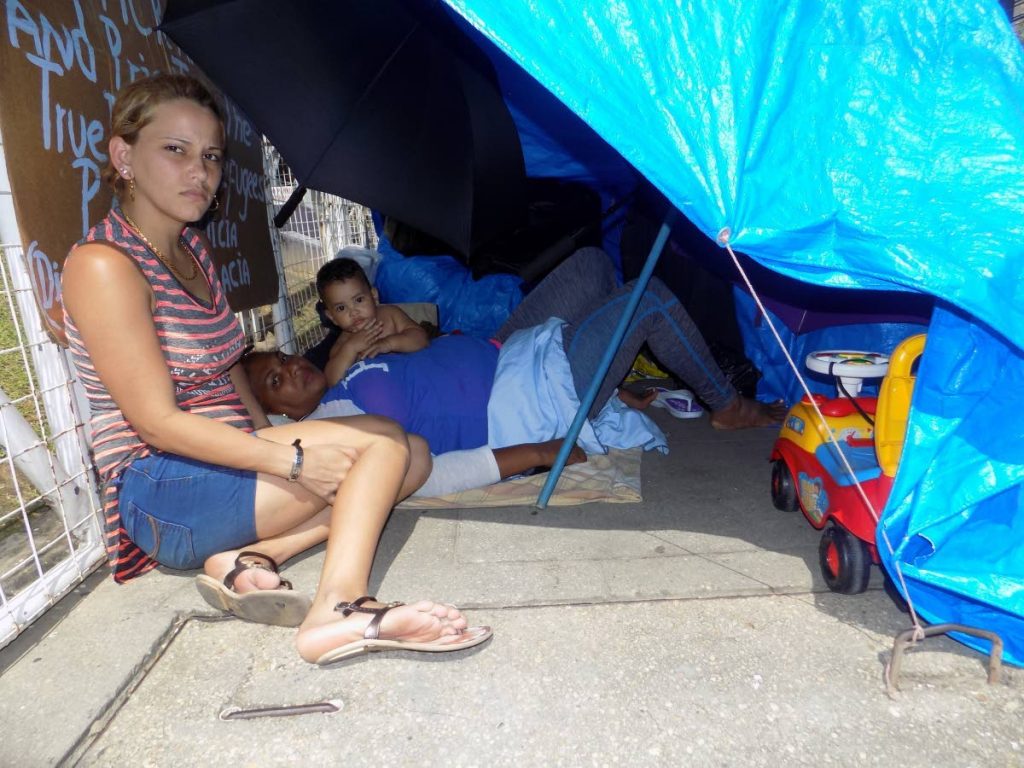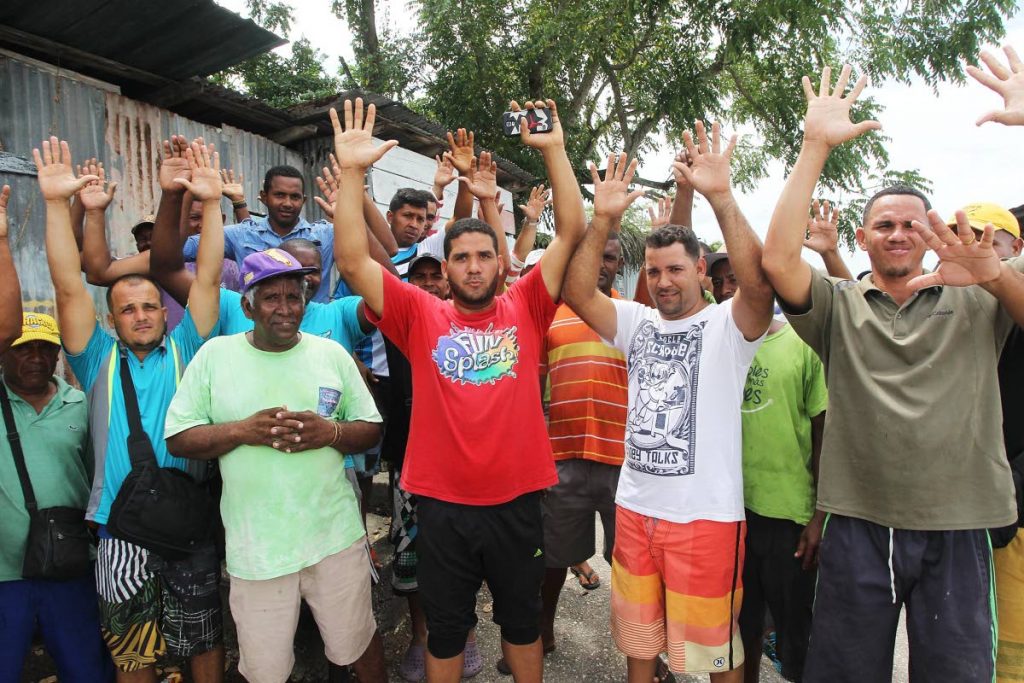Refugee emergency

WITH thousands of refugees in TT, the majority from neighbouring Venezuela, this country is facing an emergency. But in this emergency there is also the opportunity for national development and for the protection of basic human rights despite what laws exist.
These are the views of Rochelle Nakhid, coordinator of the non-governmental organisation Living Water Foundation’s Ministry for Migrants and Refugees. Living Water is an implementation arm of the United Nations High Commissioner for Refugees (UNHCR).
The issue of refugees has been in the news of late with the protest by a group of Cuban refugees.
Attorney General Faris Al-Rawi has also come under fire from Amnesty International and attorney Dr Emir Crowne for saying TT does not have laws for refugees and asylum seekers with both citing this country signing the 1951 Refugee Convention and its 1967 Protocol.
Al-Rawi has responded that the convention has not been ratified and must be enacted in domestic law while National Security Minister Stuart Young has accused Amnesty International of having an agenda and wants to impose views on the sovereign state of TT.
Last month, Young in Parliament said there was no “refugee crisis” but “a situation where there has been an increase in persons seeking refugee status and that is something we are currently addressing.”
He also reported there were Venezuelans being held for overstaying their time and some “slipping through the cracks.”

Venezuelans show how they were held up by pirates on their way to Trinidad.
So is TT facing a refugee crisis? Nakhid said the refugee situation would be classified as an emergency.
“Crisis is one thing. When you are talking about an emergency situation you are talking about large groups of people affected by a particular phenomenon and that’s what we are seeing.
“This is a fairly large group of people affected by a phenomenon that is affronting their well-being, their safety, their dignity as human beings. Their human rights.”
The numbers
In May, there were more than 5,000 refugees and asylum seekers and Nakhid said this keeps growing. About 80 per cent are Venezuelans followed by Cubans with Syrians and Nigerians currently third and fourth respectively.
Of the population, eight to ten per cent were children and they were slightly more male than female.
Nakhid said there has been a tenfold increase in Venezuelan refugees and asylum seekers in one year. She said there was a myriad of reasons for this and it was a very complex situation.
“It’s the Syrian crisis of the Americas.”
This week it was reported Colombia had taken in one million Venezuelans.
Returning to TT, Nakhid said the real numbers of Venezuelans in this country are not known by anyone and the country’s porous borders makes it difficult to track.
Living Water only has the numbers for people who have come forward and some do not to want to register as asylum seekers possibly because they have family back home and want to take things back to them.
To those registered, Living Water provides psychological services, legal services, cash assistance, food assistance and case management.
She said, however, that the NGO does not have the resources to provide for everyone and try to assist the most vulnerable and those who would be at risk of harm.
She explained Living Water receives no government funding for refugees and asylum seekers but receive funding from UNHCR, UNICEF, Catholic Relief Services and community fundraising.
“The majority of assistance does not come within the country but without.”
What they need?
Nakhid said the major need for the refugees is the right to work and the right to education. If they end up working in the informal economy they will be exploited and underpaid.
She said if refugees are allowed to work in the formal economy they will pay taxes, be protected and it will also mitigate against human trafficking.
“It is a win win for everybody.”
Nakhid pointed out there are some local sectors that are understaffed such as agriculture, especially with issues of food security, or construction.
“There are ways we can use their skills.”
She said with the right to work across the board people who are highly skilled doctors and lawyers can also work. She added at the very least an underutilised sector can be focused on and built up and this will allow people to at least feed themselves.
“What we try to promote for refugees is self-reliance because there’s never going to be enough donor funding to cover their needs.
“So if they’re not able to take care of themselves then they are basically at risk of harm from others and they can’t live a life of dignity.”
Asked about fears of refugees stealing locals’ jobs, Nakhid said fear and xenophobia appears to be a normal response to any sort of mass migration or influx of people.
She said she cannot tell people how to feel but urged citizens to look at the contribution people can bring.
“The contribution to development is something we can’t ignore. Then there are the cultural influences (such as) the food and the diversity that newcomers bring to any society.”
She added those coming into the country have a lot of entrepreneurial skills.
Nakhid said it was important to be proactive, analyse the situation adequately and design an appropriate response. She said besides utilising newcomers where labour is needed there was also a basic need for protection as a moral imperative.
“Beyond the laws that may or may not exist. I mean all of that is inconsequential. It is really that there is a moral imperative to protect and that’s existed for centuries. It has existed before all of our time. And it is what forms the basis of the laws that will be enacted to protect them anyone.”
She also pointed out the longstanding relationship between TT and Venezuela and in the past Trinidadians were received by Venezuela in times of need as well.
“The obligation to protect is not on the basis of whether we have laws or not.”
Nakhid said it was an opportunity to stand in solidarity with people who have fled persecution and added most Trinidadians are capable of doing that and have.
“Not all Trinis are fearful and xenophobic. A lot are welcoming and want to help.”
Recently a group of Cuban refugees and asylum seekers were housed in a warehouse by a Central businessman.
Nakhid said the refugee situation was also an opportunity to enact the values of faith and welcoming of the stranger underpinned most religions. This week, Archbishop Jason Gordon called for the integration of refugees in TT and said it was Christian to welcome them.
“It’s an opportunity to engage in that moral imperative and treat people as persons worthy and who are dignified human beings in the same way that we would want somebody to treat us should we end up in a similar situation.”
* Sunday Newsday’s interview with Nakhid concludes next week.


Comments
"Refugee emergency"